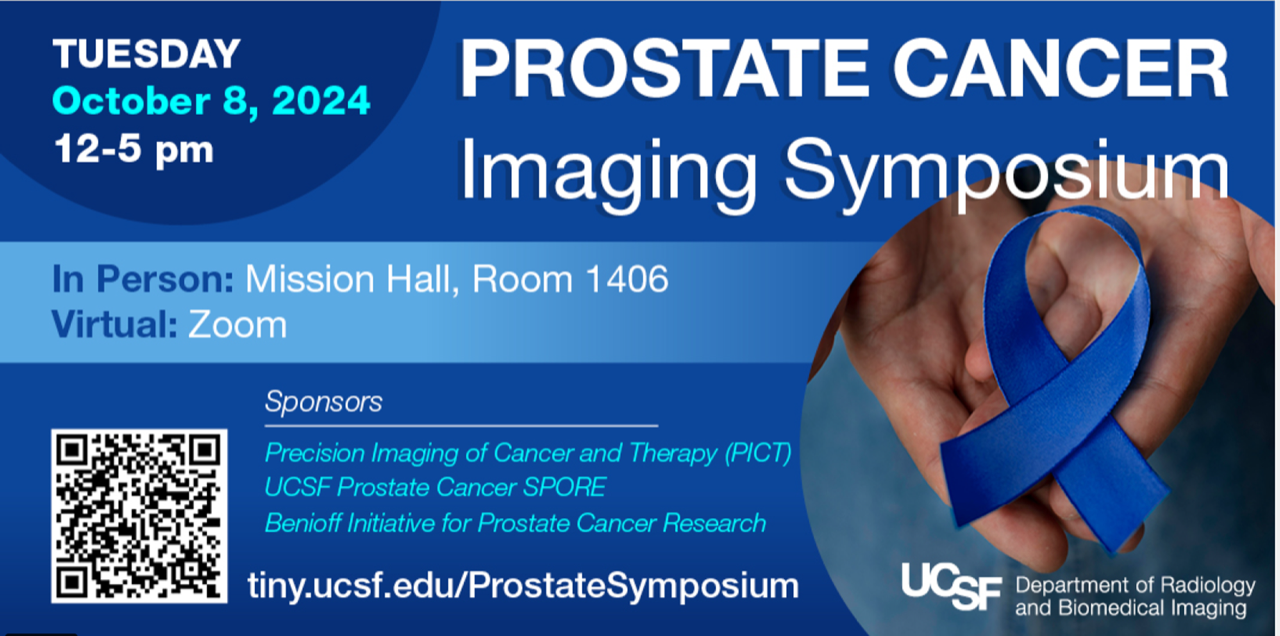UCSF Prostate Cancer Imaging Symposium 2024

In 2024 the Body Imaging Research Group hosted a Prostate Cancer Imaging Symposium at UCSF. The purpose was to bring together researchers who are developing and/or applying advanced prostate cancer imaging techniques. The speakers included imaging scientists, informatics scientists, radiologists, nuclear medicine physicians, oncologists, and radiation oncologists who presented work on PET, SPECT, MRI, and theranostic agents, and applied them across the spectrum of prostate cancer progression, from diagosis to treatment of advanced disease. The hybrid event attracted over 50 attendees and sparked numerous discussions that will hopefully seed future collaboraitons.
Special thanks to the UCSF Precision Imaging in Cancer and Therapy (PICT) and Prostate SPORE programs for sponsoring!

I continue to be impressed by work in the field of theranostics, where Drs. Hope and Flavell showed excellent work ranging from fundamental agent development to use of these methods in a clinical service.
Drs. Scholey and Hong presented exciting use cases of MRI and PSMA PET for radiotherapy of localized and metastatic disease. There was clearly strong collaborations across Radiation Oncology, Radiology and Biomedical Imaging, Urology, and Medical Oncology driving innovations in this space. The arrival of proton therapy at UCSF, targeted for 2029, will also transform treatment of primary disease.
Hyperpolarized carbon-13 MRI showed promising results across the spectrum of prostate cancer, including disease identification and biopsy guidance, treatment response of localized disease, and treatment response of metastatic disease presented by Dr. Bok and Dr. Vigneron. Dr. Sriram showed how this technology was being used in co-clinical studies, where preclinical patient-derived xenografts are used to better understand and support clinical studies.
Multiparametric MRI has become a clinical standard for early assessment of disease, and Dr. Vigneron also showed how he and others, particularly Prof. John Kurhanewicz, at UCSF played a huge role in developing mpMRI methods.
Dr. Noworolski showed how the use of detailed pathology results, progression results, and imaging biomarkers from diffusion, DCE, and spectroscopy can provide very strong predictions and cancer risk maps.
What struck me as opportunities for synergies, some of which are already happening, are:
- Cross modality integration across PET, MRI, and theranostic approaches
- Radiotherapy boosting and response monitoring in the prostate based on advanced use of multiparametric MRI and hyperpolarized MRI
- Is it time to try and revitalize MR spectroscopy with modern acquisition and reconstruction methods? Can it be made robust and fast enough for clinical use?
- Coordination of patient enrollment across trials, and even joint trials, with clear coordination with urologists and/or oncologists
- Helping to define standards for where to most effectively use advanced imaging across the spectrum of prostate cancer progression
- Better integration of imaging features with clinical and genomic biomarkers through tools such as Information Commons
Thanks to all the great speakers!
- “ PSMA Research Update” Dr. Tom Hope
- “Molecular imaging of CD46 in prostate cancer?” Dr. Robert Flavell
- “MRI for Prostate Radiotherapy: Recent Advances & Future Prospects” Dr. Jessica Scholey
- “Opportunities for Imaging AI in Radiotherapy for Oligometastatic Prostate Cancer” Dr. Julian Hong
- “Overview of Clinically-Focused HP13C-MRI Prostate Cancer Imaging Studies at UCSF” Dr. Bob Bok
- “Multiparametric Proton MRI of Prostate Cancer” Dr. Sue Noworolski
- “Perspectives on Prostate MRI Research” Dr. Dan Vigneron
- “Hyperpolarized 13C Imaging-Assisted Co-Clinical Trial of Therapeutic Response of small cell neuroendocrine prostate cancer to chemotherapy” Dr. Renuka Sriram